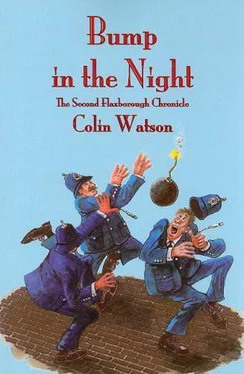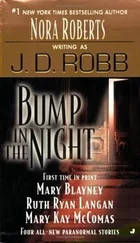“About Mr Biggadyke, for one thing.”
“Do you mean to say you’re prepared to come over into another’s man’s police division and start snooping into his family affairs just because you’ve heard some unsavoury gossip about his wife? Damn it all, man, I think it’s high time you told me exactly what you have been sent here to ferret out!” Pointer looked as if he had just swallowed a heavy draught of his own port.
“Very well, sir,” replied Purbright patiently, “I’ll tell you. We wish to find where Biggadyke obtained his fireworks. Also, if at all possible, the real reason for his using them.”
He hesitated. “You see, sir, there are three disturbing things about this case—disturbing, that is, when considered in association. One is the disappearance from a Civil Defence store in Flaxborough of a quantity of explosive. The second is the fact that Mr Larch is an instructor who has access to that store. Thirdly, as you’ve told me yourself, Mr Larch was a close acquaintance of the man we now know to have been addicted to blowing things up.”
“Are you saying that the theft of that explosive has been traced to my son-in-law?”
“Not at all. The Chief Constable believes that one of the instructors must have taken it because they have keys to the store, but he might be adopting too narrow a view. From what I know of the place, almost anyone of moderate initiative could lift what he liked if he waited for an opportunity. The point is, though, that this Biggadyke affair lays Larch open to ten times as much suspicion as could possibly have attached to him otherwise.”
“But why on earth should he have wanted to pass the stuff to Biggadyke—even if he did steal it?”
“I’ve wondered a good deal about that, Mr Pointer. I suppose you can see how serious some of the possibilities are?”
Pointer gave no sign of seeing anything of the kind.
“Your son-in-law,” Purbright went on, “is an expert in the handling of explosives. Biggadyke, to the best of our knowledge, was not. But he couldn’t resist spectacular jokes. It is conceivable, you know, that he might have been encouraged to dabble in what he didn’t understand in the hope that he’d make a fatal mistake. Long odds, perhaps, but they could have been shortened by a wrong instruction. Detonators, now...they’re extremely tricky little things, I understand.”
“But that would be a wicked thing to do,” exclaimed Pointer. “Absolutely wicked. Hector would never have thought of anything so dreadful.”
“Not even if he’d learned of his wife’s relationship with his friend?”
“I’m certain he didn’t know of that. Hilda gave no one the slightest excuse for suspecting.”
“You suspected, though, Mr Pointer.”
“I happen to be the girl’s father. Naturally I...” He faltered.
“What about her mother? Did she know?”
“Her mother? Good God!”
Purbright saw the wrinkled flesh around the councillor’s little eyes constrict suddenly with bitter contempt. The revelation of marital loathing shocked him, but he repeated his question. “Did Mrs Pointer know of her daughter’s affair?”
“I’ve no idea,” said Pointer sullenly. “She...she doesn’t discuss things with me.”
Purbright waited. Pointer’s earlier air of officiousness had gone. He seemed depressed and nervous. When finally he spoke, the edge to his voice was occasioned, Purbright thought, not by irritation but by fear.
“There’s something I wanted to tell you before we got on to this business about Hilda. It’s something that happened a year ago, but I’ve been thinking it over and I can’t help feeling it might have had some connection with...with what you’ve been hinting.”
He paused and continued more resolutely.
“I’m not going to give you any details, but this is roughly how things went. Last summer—it was just about this time of year—a girl was knocked down and killed by a car in Watergate Street. It was Stan Biggadyke’s car, a great powerful sports thing, and Biggadyke was pretty drunk. He was arrested and taken to the police station. Hector was there and he took charge. He sent the sergeant out to fetch a doctor he said Biggadyke had chosen to examine him. The doctor was out of town. There were some more delays and by the time a doctor did arrive Biggadyke was dead sober. A case went to the assizes but although the policeman who made the arrest stuck to his story that Biggadyke had been drunk at the time the fellow was acquitted. The lack of medical evidence and a good bull-shitting barrister saved him.
“What puzzled everyone who knew Biggadyke and his habits was how he’d managed to sober up so quickly in the cells. There were rumours of pep pills and cold douches and so on, but I knew that no drunk would have been able to get up to tricks like that while an experienced policeman was keeping an eye on him.”
Pointer gave a short, mirthless laugh. “That’s what I thought, anyway. Then about a couple of months after the trial I happened to be in the White Hind on business when I heard Biggadyke braying away just behind me at the bar. He was pretty far flown and I was just about to scoot out of range before the damn fellow spotted me. Then something he said caught my ear.
“I’ll never forget it. ‘Payne, old man’, he said—he’d buttonholed that blackguard who lodges at your place—‘Payne, old man’, he said—and these were his exact words—‘if ever you get pulled in for being drunk, just ask for a bucket of Larch’s luscious larrup.’ That’s what he said. Payne asked him what he meant but I couldn’t hear any more after that.”
“You drew your own conclusions, though?”
“I did, Mr Purbright. And I think I was right, too. You see, I once asked Hilda whether she packed supper for Hector when he stayed late at the station. She said no, nothing to eat, because if he wanted it the caretaker’s wife would make him a few sandwiches. But he often took a big flask of coffee, she said. Strong and black was how he liked it.”
Pointer was silent. Then he looked with anxious appeal at Purbright. “You’ll not take this any further, will you? I mean...well, nothing could be proved now, anyway.”
“Why have you told me this, Mr Pointer?” Purbright asked quietly.
“It’s worried me. That’s one reason. I have public responsibilities and I’ve always liked to have a clean conscience. You’ve no idea what an ordeal it was for me when I was pushed on that deputation to the chief. I’d been told that people here suspected Hector of covering up for Biggadyke. But theirs were only suspicions. I knew damned well he’d protected him once before and got him off one of the most serious charges in the book.”
“Can you suggest why, sir?”
“Does it matter?”
“It may matter a great deal.”
Pointer shrugged. “Well, Hector owed Biggadyke money, for one thing. Quite a lot, I believe. And Biggadyke had helped him in other ways. Socially and so forth. He was generous enough to anyone he palled up with, I’ll say that for him.”
“I see. So you don’t think it likely that Mr Larch could have wished him any harm? You reject that rather fanciful theory of mine about Biggadyke’s accident?”
“That Hector kidded him on to play with explosives, you mean.”
Purbright nodded and waited.
“No,” said Pointer in a low voice, “I don’t reject it, and that’s the truth. Just now when I said that Hector wouldn’t be capable of doing such a thing, it was because...”—he spread his hands in a gesture of helplessness—“Oh, I don’t know: he’s a member of my own family. But of course he’s capable. It’s just the sort of method he’d choose.”
“And are you still convinced that Mr Larch never found out about his wife’s meetings with Biggadyke?”
Читать дальше












